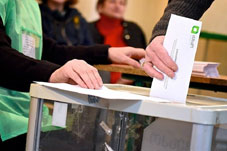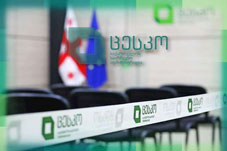
TI Georgia and ISFED leave the process of staffing the SEC Advisory Group
By Nika Gamtsemlidze
Monday, August 9
Non-governmental organizations, Transparency International Georgia and International Society for Fair Elections and Democracy, ISFED, have announced that they have decided to leave the process of staffing the SEC Advisory Group.
“The list of the organizations invited to select the members of the Advisory Group and the decision-making procedure, in our opinion, can not ensure the selection of qualified and reliable people by consensus,” reads the joint statement published by the NGOs.
According to the amendments to the Election Code of Georgia in June 2021, within 10 days from the day of calling the elections, an advisory group of the Central Election Commission (CEC) with at least 9 and not more than 15 members should be formed to submit recommendations on election disputes to the CEC.
The Advisory Group should be composed of a representative of the Public Defender's Office of Georgia and international and/or local experts selected by the monitoring organizations.
Because of this, the CEC drafted a resolution stipulating that no less than 7 and no more than 11 candidates from the group should be submitted to the CEC by local observer organizations. The CEC also invited Transparency International Georgia and the International Society for Fair Elections and Democracy to select members of the group, to which the organizations agreed.
In addition, according to the organizations, the CEC invited all the local observer organizations that were registered with the CEC during the last three general elections to select the members of the advisory group.
“During the first meeting, we were informed that 15 such observer organizations expressed a desire to participate in this process. However, the credibility, good reputation, operations, and financial transparency of the vast majority of these organizations can be seriously questioned,” reads the joint statement of ISFED and TI.
The statement of the NGOs also read that many of them have been repeatedly negatively reported in the election assessments of the credible international and local observer organizations.
In addition, the CEC resolution initially stated that observer organizations should select members of the advisory group by consensus. However, on August 6, the CEC amended its resolution stating that if the members of the advisory group could not be elected by consensus, the candidates would be elected if they were supported by at least two-thirds of the observer organizations.
According to the statement, because of the changes made by CEC, it could mean that the group would be staffed by observers with a dubious reputation. The NGOs named among-mentioned factors as the main reasons for their decision.


